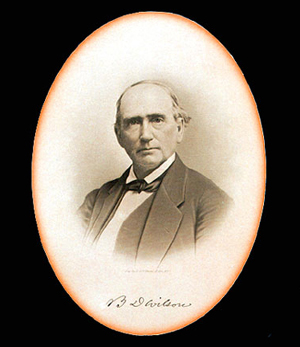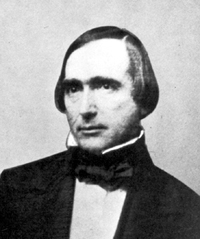Benjamin Davis Wilson facts for kids
Quick facts for kids
Benjamin Davis Wilson
|
|
|---|---|

Benjamin "Don Benito" Wilson
Photo ca. 1870 |
|
| 2nd Mayor of Los Angeles | |
| In office May 7, 1851 – May 4, 1852 |
|
| Preceded by | Alpheus P. Hodges |
| Succeeded by | John G. Nichols |
| Personal details | |
| Born | December 1, 1811 Wilson County, Tennessee, U.S. |
| Died | March 11, 1878 (aged 66) San Gabriel, California |
| Resting place | San Gabriel Cemetery |
| Nationality | U.S. and Mexican citizen |
| Spouses | Ramona Yorba, Margaret Hereford |
| Relations | George S. Patton (grandson) |
| Children | 1 |
| Occupation | Statesman |
Benjamin Davis Wilson (born December 1, 1811 – died March 11, 1878) was an important person in early California history. People often called him Don Benito Wilson. He was a politician, a fur trapper, and a rancher.
Wilson was born in Tennessee. He later moved to Alta California, which was part of Mexico at the time. He became a Mexican resident and married into a well-known local family. He also bought a large ranch called Rancho Jurupa. After California became part of the United States, Wilson served as the Mayor of Los Angeles.
Contents
Life in California: Benjamin Wilson's Journey
Starting a New Life: Rancho Jurupa
Wilson arrived in California in 1841. He came with a group called the Workman-Rowland Party. They were hoping to find a way to China.
In 1842, Wilson bought a big piece of land from Juan Bandini. This land was part of Rancho Jurupa and was later named Rancho Rubidoux. Today, this area includes most of Rubidoux, California, and a large part of downtown Riverside. Wilson was the first person to settle permanently in the Riverside area.
In 1844, he married his first wife, Ramona Yorba. Her father, Bernardo Yorba, owned a very large ranch called Rancho Cañón de Santa Ana. Wilson became well-respected and was often asked to help with matters involving Native Americans. He accepted this role and became a Justice of the Peace for the inland territory.
Exploring the Mountains: Big Bear Lake
In 1845, Wilson was asked to find a group of Native Americans. This group had taken thousands of horses from local ranchers. The Native Americans drove the horses to the high desert near Lucerne.
Wilson led 22 men into the San Bernardino Mountains to follow them. Another 22 men went through the Cajon Pass. The local Serrano people allowed Wilson's group to pass through their land. During their trip, Wilson's men hunted bears and collected 22 bear pelts. Wilson named the area Big Bear Lake. Today, that specific lake is known as Baldwin Lake. The name Big Bear Lake was later given to a different reservoir built nearby in 1884.
Serving the Public: Political Activities
In 1850, Wilson was elected to the Los Angeles Common Council. This was like a city council today. A year later, he became the second elected Mayor of Los Angeles. This happened after California officially became a state.
He also served as a Los Angeles County supervisor from 1853 to 1864. Later, he was elected to serve three terms in the California State Senate.
Developing Land: Rancho San Pascual
In 1854, Wilson started his own ranch and winery called Lake Vineyard. It was located near modern-day San Gabriel, California. He also gained ownership of the nearby Rancho San Pascual, which is now Pasadena, California. This happened through a series of land deals. He had lent money to the ranch's owner, Manuel Garfias, in 1859.
In 1863, Wilson and Dr. John Strother Griffin bought the entire Rancho San Pascual property. They worked together on many business projects in early Los Angeles, including railways and real estate. They built an aqueduct called the "Wilson Ditch." This ditch brought water from the Arroyo Seco to the dry land.
In 1864, Wilson led the first trip to a high peak in the San Gabriel Mountains. This peak was later named Mount Wilson after him. He hoped to find good wood there for making wine barrels, but the wood was not suitable. The trail he used became known as the Wilson Trail. It was a popular hiking path for many years.
In 1873, Wilson and Griffin divided their land. Griffin received most of the property, but Wilson kept some of the best land near his Lake Vineyard ranch. Griffin then sold a large part of his land to a group called the "Indiana Colony." In 1876, after the Colony had sold most of its land and started what became the City of Pasadena, Wilson began to develop his own nearby land. This became the eastern side of the new settlement.
Benjamin Wilson's Legacy
Benjamin Wilson gave some land to his son-in-law, James de Barth Shorb. Shorb named this land San Marino. Wilson also developed other parts of his land, which became Alhambra. There is a statue of him in Renaissance Plaza in Alhambra.
Wilson's first wife died in 1849. He then married Margaret Hereford. They had four children. One of his daughters, Ruth, married George Smith Patton. Their son became the famous World War II General George S. Patton. The Patton family later bought Wilson's Lake Vineyard ranch.
Wilson died at his ranch in 1878 and was buried in San Gabriel Cemetery. The last of his land in downtown Pasadena was given to Central School.
Mount Wilson, which has many television and radio towers for the Los Angeles area, is the most famous monument to Benjamin Wilson. Wilson Avenue in Pasadena and Don Benito School also honor his name.
See also
 In Spanish: Benjamin Davis Wilson para niños
In Spanish: Benjamin Davis Wilson para niños
 | William L. Dawson |
 | W. E. B. Du Bois |
 | Harry Belafonte |


